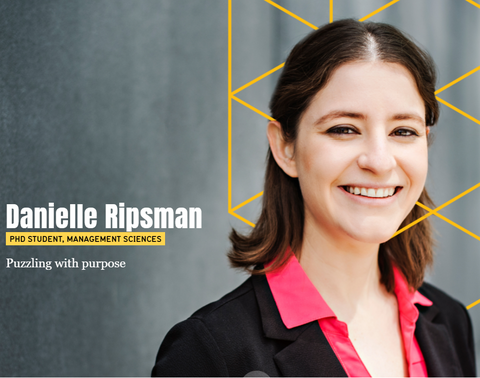
Puzzling with purpose - Management Science and Engineering PhD student featured in Waterloo News
Originally posted on Waterloo News
You know the satisfaction you get from finally cracking a tough puzzle? That’s the feeling PhD student Danielle Ripsman has been chasing her whole life.
Her passion for puzzles led her all the way to doctoral studies at the University of Waterloo, but the path to her current research in Management Sciences wasn’t always clear.
“I've always been a puzzle nerd,” Danielle says. “Even in elementary school, I was solving Japanese puzzles under my desk. And I would always have ink smudges on my face.”
When she finally discovered operations research (OR) — a field she says is “about as puzzley as you can get” — it was during her Industrial Engineering undergrad at the University of Toronto. After that, everything else fell into place.
“There's something very satisfying about solving puzzles. And OR is basically just that. You get the same adrenaline rush when you realize how to model something as when you’re a kid solving a sudoku.”
Solving real-world problems
OR focuses on solving complex practical problems for a wide variety of applications, from business to healthcare to manufacturing. It’s studied at most universities, but Danielle says, in her experience, few students know about the field, at least not until well into their undergraduate degrees.
“It’s sort of applied math. The main part of the research is building mathematical models. But because we're in the engineering department, it has to actually work in real life.”
Often dealing with big data, OR research uses advanced analytics to inform decision-making. In her PhD work in applied OR, Danielle collaborates with medical physics departments on radiation therapy treatment planning research.
“In radiation therapy, your goal is to completely irradiate a tumour. But right next to that tumour are sensitive organs. You want to spare them, but that’s not always possible when there’s a tumor embedded in lung tissue, for example. So what's the best way we can do this?”
That’s where applied OR comes in. By generating mathematical models that identify the optimal beam shape for irradiating a target, the research aims to give patients the safest treatment possible.
Pursuing applied research that has a direct impact on people’s lives is an important aspect of Danielle’s work. While she’s still weighing her options for after she graduates, whether that’s working in academia or industry, she knows she’ll keep her focus on real-world, purpose-driven research.
“I'm very lucky this turned out to be a field. And there are so many applications of this work, even outside healthcare. As long as I get to solve puzzles — and as long as I’m working on something that’s promising for the future — I think I’ll be happy.”
Building community on campus and beyond
Given the significant impact OR has on the world, the field’s low profile doesn’t square well with Danielle. While at Waterloo, she’s made it her mission to raise awareness by bringing The Operations Research Challenge (TORCH) to the University.
The annual competition, aimed at introducing high school students to the world of OR, had been planned for its tenth year (and its third at Waterloo) just before the pandemic hit, forcing organizers to cancel. As President of TORCH, Danielle says she’s looking forward to finally hosting the postponed event when it’s safe to do so.
“In TORCH, we all have this motivation to share OR with people early — to let them know that there are all these fields that hire people to solve these complex puzzles using applied operations research,” she says.
In the second year of her master’s, Danielle also took on the role of Vice-President of the Canadian Operations Research Society (CORS) Waterloo chapter, which hosts reading groups for Waterloo students and professors and invites colleagues from other universities to share their research. The regular meetup, “half social, half learning things,” went virtual during the pandemic, providing a much-needed source of community and connection.
Freedom and flexibility to choose your path
Working with her supervisor in Engineering, Professor Houra Mahmoudzadeh, Danielle says she’s had the encouragement to follow her curiosity and pursue the puzzles she’s passionate about, even if there’s a chance that things won’t work out. She says that spirit of discovery and risk-taking is part of what makes the Waterloo experience unique.
“A lot of the time, research is a strange beast in that you need to propose what you're doing before you do it. But at Waterloo, I've been given a lot of freedom and support in my research. I've been allowed to explore questions that aren't necessarily a ‘sure thing,’ which I think is really important.”